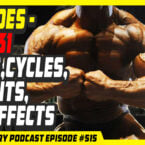Sign up to Get FREE Steroids, SARMS, Peptides eBooks
[sc:masthead-std]
[sc:salutation-std]
In the sport of bodybuilding, you find it everywhere... Bro Science! Bro Science is found on the Internet forums and you hear it from guys at the gym. Bro Science is different from Published Science.
By Published Science, I'm talking about the science published in peer-reviewed science journals or presented at scientific meetings. For example, the scientific community denied for years something that you and I have always known - specifically that the use of anabolic steroids builds muscle. Scientists did many studies that they said showed that anabolic steroids would not build muscle mass. However, what they did not do was have the participants in their studies lift weights at the same time as they took steroids.
I'm not kidding!
Eventually, when it came to steroids and building muscle mass, Bro Science trumped Published Science! And now, even the scientific community has come around to this point of view. But, Bro Science doesn't always win. Sometimes Published Science proves that some commonly held beliefs are just flat out wrong!
In his series Bro Science vs. Published Science, my friend Dr. Jim Stoppani PhD, compares and contrasts Bro Science vs. Published Science. Today, I'll share with you an article from Jim's series looking at the Mind-Muscle Connection from the vantage point of Bro Science vs. Published Science. I'm working with Jim to have him get us more excerpts of his work to us so I can publish them for you. But, the real treasure trove of Jim's work can be found on his website JimStoppani.com.
At JimStoppani.com, you get Jim's advice on workout programs that you can view, follow, and save while watching video demonstrations of Jim himself showing you on how to tweak and perform every exercise correctly. And you can download each of his workouts and exercises right to your iPhone or iPod touch. While other personal trainers and fitness gurus charge hundreds per session, Jim has developed this affordable system that brings all of his information together in one place so that you can make the most profound muscular development ever possible.
Be sure to read the following sample article on Bro Science vs. Published Science below. And be sure to stop by the EF Forums to discuss this interesting topic Bro Science vs. Published Science with Jim Stoppani.
Bro Science vs. Published Science
The Mind-Muscle Connection
by Jim Stoppani PhD
Topic: Mind-Muscle Connection
Bro science says: Bodybuilders have long understood that to get serious muscle growth you can’t just haphazardly go through the motions when you train. Not only do you need to train with relentless intensity, but you also need to train with serious focus. For example, when doing a barbell curl, you need to have laser-like focus on the biceps muscles contracting with each and every rep. It’s not enough to just let your muscles move the weight, you really need to connect with the target muscle for best results.
Published science says: No scientist in his right mind would ever admit that thinking about a muscle as it contracts can enhance its growth. It’s just too abstract a concept for those who need hard data to make a conclusion. Of course, I am not one of those scientists. I have always understood the importance of the mind-muscle connection, even if there wasn’t any data to support it. It’s one of the most critical things I learned from Arnold. He was a big believer in the mind-muscle connection, as well as visualization.
Luckily I’m not alone in being a scientist who believes wholeheartedly in this abstract concept. A very forward thinking research lab in the UK attempted to investigate if the mind-muscle connection was a viable concept. Researchers from Edge Hill University had trained lifters do 10 reps of one-arm biceps curls on three separate occasions. During one trial, they performed the curls as they normally would with no particular focus (i.e. just going through the motions). In another trial, they did the curls while focusing on the contraction of the biceps muscles with each rep. In a third trial, they did curls while focusing on moving the weight during each rep. They discovered that when the subjects focused on the contraction of their biceps while doing curls, the muscle activity of the biceps was increased by more than 20%. Although this doesn’t prove that the mind-muscle connection can increase muscle growth, a greater increase in muscle fiber activity could lead to enhanced muscle growth over time. They also found that when the subjects focused on moving the weight while doing curls, their muscle strength was increased by about 10%.
Winner: Bro science. Although one laboratory supports the reality of the mind-muscle connection, few researchers would be willing to agree that it’s a real thing. But the forward thinkers, like you, me, and Arnold know it is very real.
Do this: The mind-muscle connection is important, so use it well. But it’s important to know how to focus for the specific goal. To enhance muscle growth, focus on the target muscle as it contracts with each rep. This is known as internal focus. You need to block out your surroundings and really try to connect with the target muscle. Wearing headphones with your favorite music playing can help tremendously to block out your surroundings and focus deep into that muscle. Think about the muscle fibers getting shorter as they contract. Then hold the peak contraction for a second and focus on flexing the muscle as hard as possible. Then as you lower the weight, focus on the muscle fibers slowly lengthening as they resist the weight.
To enhance muscle strength, focus on moving the actual weight through each rep and not on the muscle contracting. This is known as external focus. Your goal is to focus on the object you are moving. This can help you to lift more weight on a one-rep max attempt an help you complete more reps with a given weight.
[sc:signoff-std]
Merchant, D. C., et al. Attentional focusing instructions influence force production and muscular activity during isokinetic elbow flexions. Journal of Strength and Conditioning Research 23(8): 2358-2366, 2009.
Marchant, D. C. Attentional focusing instructions and force production. Front Psychol. 2010;[1:21]0. Epub 2011 Jan 26.
Marchant, D. C., et al. Instructions to adopt an external focus enhance muscular endurance. Res Q Exerc Sport. 2011 Sep;82(3):466-73.





